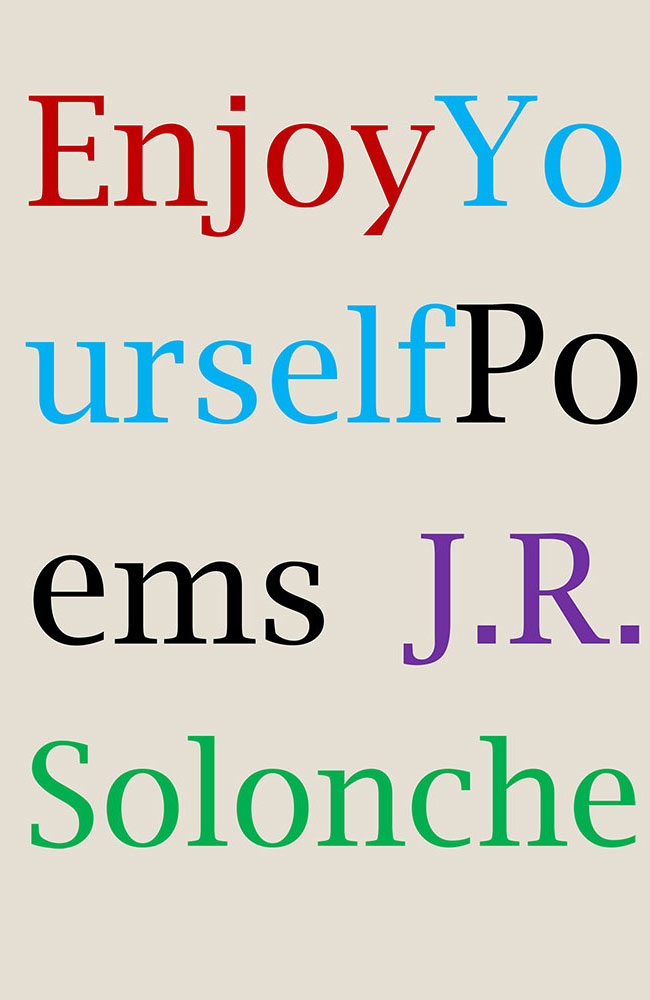Publishers of international
prose, poetry, art,
and literary hybrids.
Book
Enjoy Yourself
Solonche is productive and prolific, but that doesn’t water down his poetry… He can compress a philosophical treatise into three lines… His epigrammatic tidy poems are philosophic gems. Solonche sees humor and encapsulates it; he frames a thought in perfect verse… He’s playful and profound – the more he writes, the more he seems to know. Beneath the Solonche simplicity are significant social comments, and his goodwill reinforces the best in us.
Author: JR Solonche
Paperback : 104 pages
ISBN-10 : 1947175211
ISBN-13 : 978-1947175211
About the Author
J.R. Solonche is the author of 17 books of poetry and coauthor of another. He lives in the Hudson Valley.
Abandon all bullshit ye who enter here. J. R. Solonche’s new collection is Enjoy Yourself, and he means it. Here is where the questions lead not to a comforting mystery but to the courage needed to live not with the questions but with no answers. Look into the abyss with Solonche and be amazed at all he doesn’t see. As he declares in the poem “Testimony,” “I want to prove a poet can do this without telling it slant.” Lest you are thinking, “Oh no, not another poet savoring his despair,” know that in poem after poem you will welcome a wry smile. And in the end, after all the bullshit has been has been cleared away, enters his daughter evoking his love and a father’s sigh, and the anything but slant yet nuanced assurance that “And now, when they ask me, I will answer,/with passion of my own, and with my own/audacious authority. Go out and listen to the moon./It speaks for you.
—Jack Ridl is the author of Saint Peter and the Goldfinch and Practicing to Walk Like a Heron, named best collection of poetry by ForeWord/Indie Press Review.
According to Lord Polonius in Hamlet, “brevity is the soul of wit.” In the poetry of J. R. Solonche, brevity, soul and wit co-exist superbly. Start with any of his poems. You’ll find, unlike much of what is written these days, the wit is never far from the surface. As for the brevity, imagine an appetizer that’s as filling as a main course. And, after the meal, after the laughter, the soul will be what lingers.
—John Grey, author of What Else Is There, Main Street Rag’s Editor’s Poetry Series
Solonche is productive and prolific, but that doesn’t water down his poetry… He can compress a philosophical treatise into three lines… His epigrammatic tidy poems are philosophic gems. Solonche sees humor and encapsulates it; he frames a thought in perfect verse… He’s playful and profound — the more he writes, the more he seems to know. Beneath the Solonche simplicity are significant social comments, and his goodwill reinforces the best in us.
— Grace Cavalieri, Washington Independent Review of Books
“olonche, an accomplished poet, employs various forms in this compilation, including haiku, prose poem, and free verse. The poems often imaginatively enter into the natural or material world via anthropomorphic similes… Many works have an aphoristic quality that recall Zen koans, and they can be playfully amusing or even silly… A strong set of sympathetic but never sentimental observations.
— Kirkus Reviews
The spirit of Horace, the melancholy of time slithering away and turning all to dust, tempered with art, wit, and good grace…
— Ricardo Nirenberg, editor of Offcourse: A Literary Journal
In a style that favors brevity and pith, J.R. Solonche brings a richness of experience, observation, and wit into his poems. Here is the world! they exclaim. And here, and here, and here! Watched over by ancient lyric gods – Time, Death, and Desire — we find the quotidian here transformed.
— Christopher Nelson, editor of Green Linden Press
Solonche is at home with himself, “even at home,” as he declares in one of his poems. His witty and matter of fact reporting of the simple observations invites us in. It is a pleasure for us to visit him in these poems. They are clouds in the sky of his mind; rich in their shapes and in their subtle colors. His poem Dreams reads: Only in / the best / of dreams / is there / no such thing / as a dream. Similarly, in his poems, he reaches a place where there is no such thing anymore as a poem.
— Korkut Onaran
"I admire [Serving House Books] for the quality work they’re putting out plus the notable writers they’re publishing."
Jack Smith, The Writer Magazine

